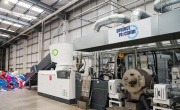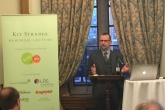ZWS launches circular economy business case

Zero Waste Scotland has today (16 January) released a report highlighting how Scotland can ‘capitalise on the industrial and economic opportunities of a more circular economy’.
'Circular Economy Scotland', commissioned by Zero Waste Scotland (ZWS) and produced by the Green Alliance, with support from the Scottish Council for Development and Industry (SCDI), identifies the ‘unique strengths that Scotland has to lead and unlock economic opportunities’ in the areas of: oil and gas; food and drink; and finance. These three areas were targeted as they are seen as ‘growth sectors’ by the Scottish Government Economic Strategy.
Oil and Gas
The report states that decommissioning of offshore assets is expected to involve spending £10 billion over the next decade, and £35-50 billion by 2040, but highlights that money could be saved by recycling and/or reusing this infrastructure.
For example, the Hutton oilfield structure contains $1 million-worth of copper (approximately £660,000) and an ‘abundance’ of duplex steel, which can fetch double the price of mild steel.
The report argues that as alloys can easily be detected by handheld devices, the oil and gas industries could reap savings by recycling the different alloys and materials used in their infrastructure.
However, it states that reusing the infrastructure could save even more money. Indeed, the report estimates that for every kilometre (km) of pipeline repurposed to transport CO2 instead of gas and reused in a carbon capture and storage (CCS) pipeline, companies could save £1.63 million and reduce carbon emissions by 80 per cent. This is largely due to the fact that old pipelines would not need to be removed, and new pipelines would not need to be built, thus saving on both material and labour costs.
The Green Alliance recommends that for pipeline to be reused in this way, collaboration would be needed across the oil and gas industry, along with a plan for CCS roll-out.
This could include ‘the shared use of infrastructure’ and the creation of ‘hubs and clusters’ bringing different companies together and jointly using transport and processing infrastructure.
Pipelines that are not in good enough condition for reuse in a new network could be used for construction, the report suggests, which would have the value of £0.26 million per km, while reuse for scrap would only save companies £0.05 million per km.
It concludes that by using these materials in a circular way, around 60 per cent of the cost of decommissioning would ‘ultimately be borne by the government through tax relief’.
As such, it argues that a government-industry partnership to further this ‘would make sense’.
Food and Drink
In terms of making the food and drink industry more sustainable, Green Alliance recommends that businesses look to capture and process their wastes ‘more effectively’.
It states that the ‘least radical’ route could be ensuring that surplus food is redistributed. For example, the report outlines that this practice could be facilitated by tracking the food’s movements through distribution IT to ensure that food redistribution charities can ‘count on redistributed food and buy less food (from producers/stockists) to feed the same number of people. It also suggests that more farmers could take to online outlets to ‘glean’ their unharvested crops (i.e. sell any edible produce not harvested for clients to other buyers). Green Alliance argues that ‘the costs of such a system would be modest, and even a small increase in the use of harvested food could be significant’.
Another suggestion in this ‘least radical’ category is to recover more energy from food waste via anaerobic digestion (AD). The report states that the technology should be appealing to businesses as it is already ‘proven, financially supported and requires only limited collaboration’. Indeed, the report states that digesting all the food waste in Scotland would save £23 million in avoided landfill costs, and gain £27 million of value from generated energy.
A more ‘radical’ route that businesses could take to move to a more circular economy is ‘biorefining’ (through conversion or extraction) their organic waste and byproducts before sending them to AD. For example, the report identifies that whisky distilleries could save £140 million by refining the ‘pot ale’ from the distillery process into ‘high lysine protein meal’ for fish farming, and yet more by refining waste draff into phytosterols, which are used by the pharmaceutical industry in cholesterol-lowering medication. The leftover waste could then be sent to AD for energy recovery.
Green Alliance suggests a brokerage service could be set up to help match feedstock with potential users, address transport challenges and support the financing of new projects. However, this would need to be guided by an assessment of technology maturity and the scale of operation required by different biorefining processes.
Finance
The last sector that the ZWS report investigates is the finance sector. This, it argues, could be a ‘key enabler for the circular economy’ as it could help finance technologies and infrastructure that is needed, but isn’t necessarily viable due to a lack of grant funding and/or lack of relevant data on viability and feedstock demand.
For example, the sector could create or support an institution to match existing cleantech investors with those seeking funding. This could increase the ‘quantity and quality of interaction in the sector and reduce fragmentation, enabling business links to be made across supply chains’, thus making the process of finding suitable finance easier.
In conclusion, the report states that Scotland needs a ‘targeted, challenge-led innovation strategy run by institutions empowered to drive technically risky, but potential big-win circular economy pilot projects’.
Report launches ‘six-month period of engagement’
Speaking earlier today, Richard Lochhead, Scotland’s Cabinet Secretary for the Environment, said: “Today’s report highlights some of the potential benefits for a number of Scotland’s key industries and I look forward to discussion on these issues in the coming months. This also marks the start of a six-month period of engagement and debate led by the Scottish Government on the opportunities of a more circular economy.
“Scotland is already recognised internationally as an early mover towards a more circular economy. To maintain that momentum, we need to bring the concept to life for businesses, the public sector and consumers and show what a more circular approach means in practice. That means exploring the different business models, skills and systems we need in our industries, and looking at the best way to help consumers reuse, repair and recycle in their homes and communities.”
Building on the theme from his speech on the circular economy at the Kit Strange Memorial Lecture yesterday (15 January), Chief Executive of ZWS Iain Gulland, said: “Zero Waste Scotland welcomes the focus on the circular economy and we look forward to contributing to and encouraging debate. The circular economy is coming to prominence in discussions about Scotland’s future, because of the economic opportunities and environmental benefits it presents. Reliance on increasingly scarce resources will have a huge cost implication for Scotland in years to come, if we don’t adapt.
“This new report shows that, by moving to a more circular economic model, there are tremendous opportunities to secure and grow businesses in key sectors, securing and creating jobs, and a sustainable economic future.”
Read the full ‘Circular Economy Scotland’ report.







